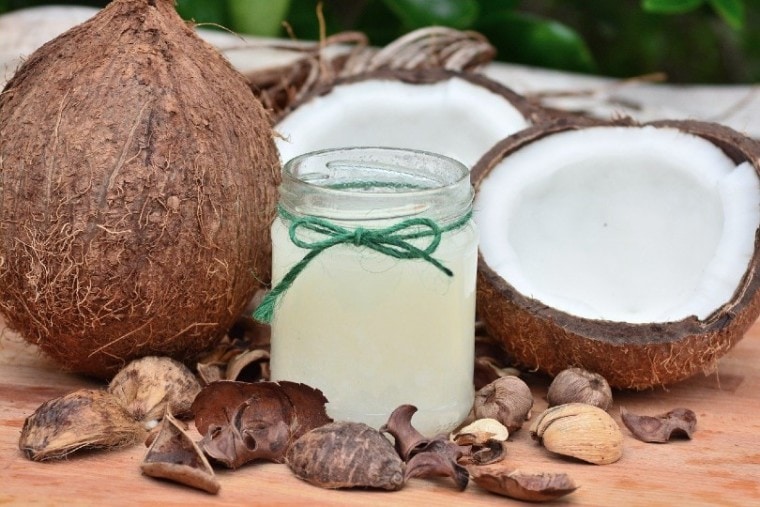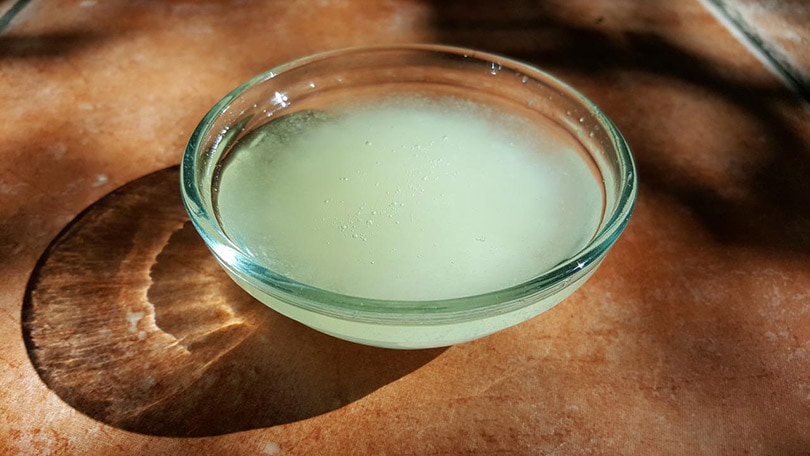
Click to Skip Ahead
Coconut oil is known for its health benefits and can be a good supplement to add to your dog’s meals to aid in their nutrition and coat care. However, dog owners need to understand how coconut oil affects their dogs’ health before feeding it to them.
While there are good things about coconut oil, it can also lead to negative effects, especially if you don’t feed it to your dog properly or serve the wrong amounts. We have all the information you need to help you decide if introducing coconut oil to your dog’s diet is the right move for your dog.
How Does It Work?
Coconut oil is a plant-based oil that’s extracted from mature coconuts. It consists of 90% saturated fats. While many have been led to believe that fats are bad for the body, there are good kinds of fats that the body needs for healthy daily functioning. Coconut oil contains good fats, which are mostly medium-chain triglycerides (MCTs).
MCTs in coconut oil are composed of lauric acid, which is a potent fatty acid with antibacterial, anti-fungal, and anti-viral properties. They also contain capric acid and caprylic acid. These fatty acids have antifungal properties.
It’s important to note that dogs need a diet that has a healthy balance of fats, and they use fat as an energy source. So, they can benefit from eating coconut oil because of its high-fat content. However, it is not recommended to add too much of this oil to your dog’s diet; like any other fat, coconut oil is calorie-rich.
What Are the Different Types of Coconut Oil?
You can find several different types of coconut oil. Here’s a brief overview of some of the main varieties that you can find in stores.

Virgin or Unrefined Coconut Oil
Virgin or unrefined coconut oil is considered the best kind of coconut oil. It’s the least processed and doesn’t undergo any heat processing. This helps preserve and retain more antioxidants than more processed varieties of coconut oil.
Virgin or unrefined coconut oil is also often referred to as raw coconut oil. It gets its name from its process of quick-drying or wet-milling raw coconut meat. Once the coconut meat is harvested, it can go through a wet-mill process, which just means that the meat is rendered into coconut milk. The fat is then separated from the milk. The coconut meat can also go through a quick-drying process, which involves drying out the meat and then squeezing the oil from it.
Virgin or unrefined coconut oil still retains a good amount of nutrients and beneficial enzymes because it’s never heated in high temperatures.
Refined or RBD Coconut Oil
Rather than being harvested from raw coconut meat, refined coconut oil is made from copra, or dried coconut kernels. Because copra needs to go through a decontamination process, it gets cooked at high temperatures to kill any bacteria. Because of this process, refined coconut oil loses some of its natural nutritional value.
Refined coconut oil can also contain some additives and preservatives. It’s often used as a cooking oil because it can handle high heat.
RBD stands for refined, bleached, and deodorized and is much more processed than any other variety of coconut oil. Because it’s highly processed, it loses a lot of its nutritional value, flavor, and fragrances.
Since it loses its natural taste and smell, it’s often used in food preparation. It’s also the cheapest kind of coconut oil, and many consider it to be low quality.
Where Is It Used?
Coconut oil can be used as a cooking ingredient or consumed as a supplement. It can also be used topically to treat hair and skin issues.
Advantages of Coconut Oil
When coconut oil is used topically, it can help alleviate skin irritation and nourish and moisturize the skin and coat. It’s also often used to soothe dry, flaky skin. It can be used topically on dogs’ noses and paw pads.
Since it has antifungal properties, veterinarians in Asian countries often use it topically to help fight dermatophytosis or fungal skin infections, such as ringworm, in pets.

Disadvantages of Coconut Oil
One of the main disadvantages of coconut oil is its varying qualities. Refined coconut oil is the most affordable type of coconut oil, but its nutritional value is considerably lower than virgin coconut oil. Unfortunately, high-quality coconut oil can be very expensive and can cost more than olive oil.
Since coconut oil is calorie-dense, too much can be detrimental to a dog’s health, as it can result in weight gain. It’s best to consider if feeding your dog coconut oil is necessary and to decide with your veterinarian how much and how often to offer it.
When applying coconut oil topically to your dog, one of the disadvantages is that if you apply it in excess, they will likely make a mess around the house. Be mindful and only put on a small amount at a time. Massaging it into the skin is better than applying excessive amounts.
FAQ
What’s the Difference Between Coconut Oil and Coconut Butter?
Coconut oil and coconut butter are made from different parts of the fruit. Coconut oil is extracted from coconut meat, while coconut butter is puréed coconut meat, which also includes fiber, not just the oil.
A common comparison of these coconut products is peanut butter and peanut oil. Peanut butter consists of ground-up peanuts, while peanut oil is an extraction of oil from the rest of the peanut. Both products are safe for dogs to eat if they ingest them in small quantities.

How Much Coconut Oil Is Safe for My Dog to Eat?
Small dogs should start with ¼ teaspoon of coconut oil, while medium to large dogs can consume between 1 teaspoon and 1 tablespoon of coconut oil a day. If you have a dog that’s overweight, you might not want to add more calories to their plate. Before adding coconut oil to your dog’s diet, please make sure to consult with your veterinarian.
Can Coconut Oil Replace Fish Oil?
Both fish oil and coconut oil have different benefits, so one can’t completely replace the other. However, both of these oils can offer various benefits regarding your dog’s diet and skin health. Just remember to always be mindful of the calories.

Conclusion
Coconut oil is a supplement that has significant benefits that dogs can enjoy. It can help improve the skin and coat and even treat skin infections. However, it can also cause unnecessary weight gain. So, the best way to find out if your dog would benefit from coconut oil is to have a conversation with your veterinarian. If you get cleared to feed coconut oil to your dog, make sure to use a high-quality variety, like virgin or unrefined coconut oil, and avoid buying low-quality refined or RBD coconut oil.
Featured Image Credit: moho01, Pixabay








